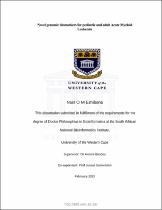Novel genomic biomarkers for pediatric and adult acute myeloid leukemia
Abstract
Acute myeloid leukemia (AML) is a heterogeneous type of blood cancer that affects individuals of all ages. AML patients are categorized into favorable, intermediate, and adverse risks based on patients' genomic features and chromosomal abnormalities. Despite this risk stratification, the progression and outcome of the disease remain highly variable in pediatric and adult patients, which emphasizes the importance of finding more accurate genomic biomarkers studying the gene expression profiling of pediatric and adult AML patients to facilitate and improve the risk stratification of the patients. Consequently, two research aims were proposed to study the prognostic heterogeneity for pediatric and adult AML. In pediatric AML, the research project was set to identify a genetic signature related to patients with FLT3-ITD mutation and poor survival. While for adult AML, this study focused on establishing a genetic signature predictive of prognosis with the ability to accurately reclassify the risk of AML intermediate group.

